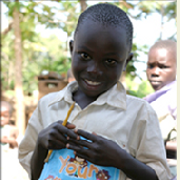Brazil (MNN) — The 2010 World Cup in South Africa generated over 3 million visitors from across the globe to join in weeks of festivities. The next World Cup is not until 2014, but with those kinds of numbers, host country Brazil has already begun to prepare.
Many are excited for the games to be played in a such a beautiful place, and they expect the World Cup along with the 2016 Olympic Games to be a significant boost for the Brazilian economy. The two large sporting events will be an all-around good thing for the country then. Right?
Unfortunately, not for the poor.
One of the largest threats to the impoverished of the country as it relates to the events is a swell in human trafficking. A rise in the number of sex slaves is inevitably tied to these large sporting events, as was evidenced at the 2010 World Cup in South Africa and the 2010 Olympic Games in Vancouver, Canada. Where the demand is high, so also will be the supply.
The "supply" in Brazil is already disturbingly high and will only grow. Kathy Redmond with Compassion International describes the current scene as "pure evil." Redmond reports that parents often sell their children into prostitution, most commonly around the age of 12. Many young girls live in fear of rape–an all too common occurrence in the country. Kidnappings are not unheard of either.
Young Brazilian girls are sold, coerced or abducted into the sex trade, blossoming numbers of victims to as many as 400,000, according to the U.S. State Department.
The likelihood that these numbers will skyrocket as we approach these two events is extremely high, but even now, traffickers are plotting their moves. "There's definitely a fear among the project directors and among Compassion Brazil that the girls are going to be heavily recruited for these events beginning very early," says Redmond.
Their fear is legitimate. An International Mission Board worker told Mission Network News that traffickers "started the trafficking of people in 2004 as soon as they found out the World Cup would be in South Africa" for 2010. (Read the full story here.) That was six years ahead of the event. With just three years to go until the next games, young girls and boys may already be getting trafficked and prepped.
So whose problem is this exactly? Some would say the issue should fall to the Brazilian government, but Redmond says the government is already busy trying to cover up Brazilian slums with nicer houses for the upcoming events. Aesthetics are their aim. So perhaps the police could take over? But police will already be spread awfully thin tackling the security issues that come with millions of tourists. Even if police start scooping girls and boys up now, there are few safe homes to take them to.
So who is to step up for the defenseless? Who is to speak out for the voiceless? Redmond says: Christians. "Christians are needed so much in this area that it's time that they put down their guards and talk about something like this that affects so many children."
Compassion is already planning ways to be Christ to those suffering at the hands of traffickers. "What we would like to do is be able to try to help build some of these girls' homes–and even if they need boys' homes, to do the same thing–so that they can be taken away from this environment and be redirected toward what they can do as they get older, toward something that actually brings them choices in life. They don't have a choice."
Prevention through safe houses and the expansion of child sponsorship will be vital, but what may help the most is for you to get the word out as soon as possible. Redmond asks for you to make your church aware of the issue and start thinking of ways to help. Possible opportunities could be to build a girls' home in Brazil, to support a ministry fighting the issue, or to sponsor a child in Brazil. Once you get something started, contact your local media and get them in on it, too. Homes need to be built as soon as possible to provide a shelter for girls and boys well before the events start, when it may be too late.
Keep updated on what Compassion is doing at their Press Center, or with their blog. If you feel called to do something about this right now, e-mail Redmond at [email protected]. Sponsor a child here. The full interview with Redmond will tell you where sponsorships are most needed.
Learn more about this issue through Redmond's most recent blog post about her visit to Brazil.

